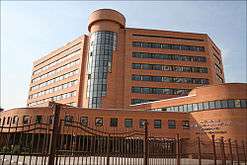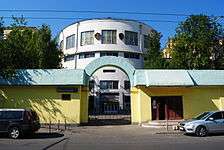D. Mendeleev University of Chemical Technology of Russia
|
Российский химико-технологический университет имени Д. И. Менделеева | |
| Type | Public |
|---|---|
| Established | 1898 |
| Rector | Vladimir Kolesnikov |
Academic staff | 550 |
| Students | 10,500 |
| Undergraduates | 10,000 |
| Postgraduates | 500 |
| Location | Moscow and Novomoskovsk, Russia |
| Campus | Urban |
| Website | www.muctr.ru |
D. Mendeleev University of Chemical Technology of Russia is a public university based in Moscow, Russia.[1] It is the largest higher educational institution and research center of chemistry and chemical engineering in Russia, and one of the largest in the world.
The university was founded in 1898 as a technical college, based on a popular proposal by professors from the Imperial Moscow Technical School to specially train “Chemical and Mechanical Engineer Assistants” approved by the Moscow City Duma on February 9, 1880, to commemorate the 25th Anniversary of the Tsar Alexander II's reign. The college was later named in honor of Dmitri Mendeleev and was extensively expanded during the Soviet era, receiving the Order of Lenin and Order of the Red Banner of Labor awards. In 1992, the Russian government awarded the college the status of university, and in 2014, D. Mendeleev University was given the ranking D by accrediting agency Expert RA and listed as one of the best higher education institutions in the Commonwealth of Independent States.[2]
D. Mendeleev University operates several campuses in Moscow and a branch in the nearby city of Novomoskovsk, Tula Oblast. The university's main campus is located at Miusskaya Square in the Tverskoy District of the Central Administrative Okrug in Moscow.


History
Moscow Industrial College
The college foundation was laid on Miusskaya Square in Moscow on May 23, 1898. The classes began on July 1 in leased premises, and the first class was out of school in 1906.
Moscow Industrial College had a strong faculty, many of whom had been professionally trained at the Imperial Moscow Technical School and Moscow State University. This fact predetermined the dynamic development of the new educational institution, which was transformed into the Moscow Chemical Technical College in 1918, and began to churn out applied engineers.
D. Mendeleev Institute
In 1920, Moscow Chemical Technical College was used as a basis to establish Moscow D. Mendeleev Institute of Chemical Technology (MCTI), which became the first specialised chemical technical school establishment in Russia to train professionals for the chemical and related industries, and made a hefty contribution in the industrial development and defense potential, especially during World War II.
It was named after the great Russian scientist Dmitri Mendeleev, the discoverer of the Periodic law, the establishment of which established scientific foundation for world's most further chemical research.
D. Mendeleev University
In 1992, the Decree by the Russian Government transformed Moscow D. Mendeleev Institute of Chemical Technology into D. Mendeleev University of Chemical Technology of Russia.
Organization
The university includes 9 faculties, 4 institutes and 2 higher colleges.
Faculties
- Faculty of Biotechnology and Industrial Ecology
- Faculty of Chemical Engineering
- Faculty of Natural Sciences
- Faculty of Technology of Inorganic Substances and High Temperature Materials
- Faculty of Technology of Organic Substances and Pharmaceutical Chemistry
- Faculty of Technology of Oil&Gas Chemistry and Polymer Materials
- Faculty of Information Technologies and Management
- Faculty of Engineering Chemistry and Technology
- Humanitarian Faculty
Institutes
- Institute of Modern Energetics and Nanotechnology
- Institute for Problems of Chemistry and Sustainable Development
- Institute for Management and Economics
- Novomoskovsk Institute (MUCTR Branch, located in Tula Oblast, Russia).
Higher Colleges
- Higher Chemical College of the Russian Academy of Sciences
- College for Nature Resource Management
Notable alumni
- Pyotr Demichev, Soviet Minister of Culture and First Deputy Chairman of the Presidium of the Supreme Soviet
- Valeria Khomyakova, first female pilot of the Soviet Air Force
- Dmitrii Knorre, chemist and biochemist, winner of the Lenin Prize
- Valentin Koptyug, scientist specializing in physical and organic chemistry
- George Koval, American-born spy for the Soviet atomic bomb project and Hero of the Russian Federation
- Valery Legasov, inorganic chemist, member of the Academy of Sciences of the USSR, chief of the Chernobyl disaster investigation
- Vladimir Yevtushenkov, majority owner and chairman of Sistema
References
- ↑ http://www.muctr.ru/en/ University homepage in English
- ↑ https://ru.wikinews.org/wiki/%D0%A1%D0%BE%D1%81%D1%82%D0%B0%D0%B2%D0%BB%D0%B5%D0%BD_%D1%81%D0%B2%D0%B5%D0%B6%D0%B8%D0%B9_%D1%80%D0%B5%D0%B9%D1%82%D0%B8%D0%BD%D0%B3_%D0%92%D0%A3%D0%97%D0%BE%D0%B2_%D0%A0%D0%BE%D1%81%D1%81%D0%B8%D0%B8_%D0%B8_%D1%81%D1%82%D1%80%D0%B0%D0%BD_%D0%A1%D0%9D%D0%93#%D0%A0%D0%B5%D0%B9%D1%82%D0%B8%D0%BD%D0%B3_%D0%92%D0%A3%D0%97%D0%BE%D0%B2_%D0%A0%D0%BE%D1%81%D1%81%D0%B8%D0%B8_%D0%B8_%D0%A1%D0%9D%D0%93 Expert RA rating list in Russian